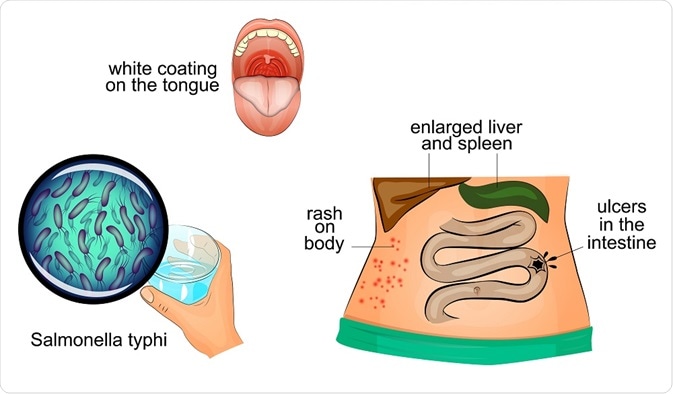What is typhoid?
Typhoid fever, also known as enteric fever, is a bacterial infection with the bacterium Salmonella enterica serotype Typhi. It is usually spread through food or drink that has been contaminated with fecal matter.

Festa | Shutterstock
How is typhoid treated?
Antibiotics
Typhoid fever can be successfully treated with an appropriate course of antibiotics. If the condition is detected early, disease is usually mild and most cases can be treated with a one or two week course of antibiotics. In more serious cases, hospitalization and the intravenous administration of antibiotics may be necessary.
Antibiotic treatment is started on the basis of a patient presenting symptoms that are clinically similar to those of typhoid fever. This approach to treatment is called empirical treatment. Oral antibiotics usually need to be taken for a period of 7 to 14 days.
Diagnosing Typhoid
In the early stages, diagnosis may be based on clinical symptoms. In the first week of infection, laboratory tests such as the Widal test may give a false negative result due to the test's poor sensitivity and specificity.
Symptoms of typhoid include:
- Fever
- Fatigue
- Headache
- Abdominal pain
- Diarrhea
- Constipation
- Weight loss
- ‘Rose spot’ rash

Artemida-psy | Shutterstock
The Widal test is a serological test where Typhi bacteria are mixed with O and H antibodies from a patient with suspected typhoid fever. As this is not a reliable testing method, it is not widely used in the US or other developed countries, but it is still a method used in developing countries where typhoid fever is endemic, and where there are limited resources.
In these instances, the Widal test provides a fast and affordable option for testing for typhoid fever. More reliable, but more costly test alternatives include performing blood, stool, urine, or bone marrow cultures.
Antibiotic resistance to typhoid
Blood, stool and urine samples taken at the time of diagnosis will generally be tested to ascertain what strain of typhoid fever the patient has, so that the right antibiotics can be administered. However, over the years, many antibiotics that used to be effective against typhoid have now become ineffective due to the typhoid bacteria developing resistance against the drugs.
To eliminate the risk of treating the infection with an ineffective antibiotic, an antibiotic sensitivity test is performed. The antibiotics that are found to be successful in killing the bacteria are then administered to the patient.
Usually, symptoms start to resolve within 2 to 3 days of starting the course of antibiotics. However, the complete course of antibiotics needs to be taken to prevent recurrence or spread of the disease in cases where the infection has not been completely eliminated.
In severe cases, antibiotics may need to be administered intravenously in a hospital setting. In the case of severe complications such as a ruptured intestine or severe internal bleeding, emergency surgery and other management is necessary.
Alternatives to antibiotics for typhoid
Aside from the use of antibiotics, home treatment should also include complete bed rest, a diet of regular and healthy meals and the intake of plenty of water. Personal hygiene and good sanitation are important in preventing the further spread of typhoid fever.
Should life threatening complications from typhoid fever occur, surgery may be required in the case of internal bleeding or splits in sections of the digestive system. However, these complications are rare in those treated with appropriate antibiotics.
Hospital treatment can help patients to improve in 3 to 5 days, but patients may need to stay in hospital for several weeks until they are well enough to leave.
Typhoid relapse
Sometimes symptoms reoccur after successful treatment. The symptoms are generally milder and don’t last as long, but another course of antibiotics is recommended. After a patient is symptom-free, another stool test can be performed to be sure no Salmonella typhi bacteria are still present. If bacteria is detected, additional courses of antibiotics may be given.
Perspectives
Although still used in countries where appropriate resources and adequate funding are unavailable, typhoid is diagnosed using the Widal test, which, although cheap, is not a reliable diagnostic tool due to the fact that it can be influenced by a number of factors, sometimes producing false results.
More suitable diagnostic tools are blood, stool, urine and bone marrow cultures. Typhoid can be successfully treated with antibiotics, however a number of antibiotics have since become resistant to the infection. Timing is key in preventing typhoid fever from escalating and becoming life threatening.
Further Reading
Last Updated: Jun 17, 2023